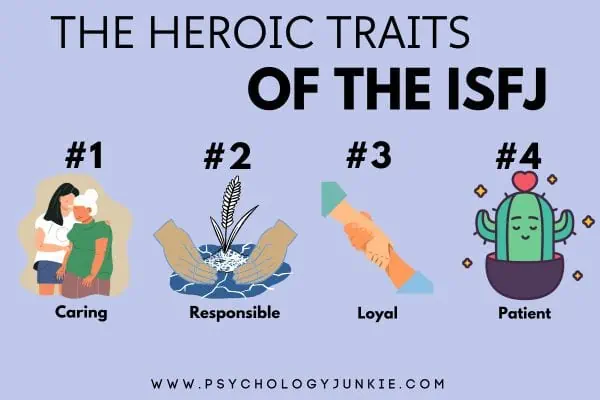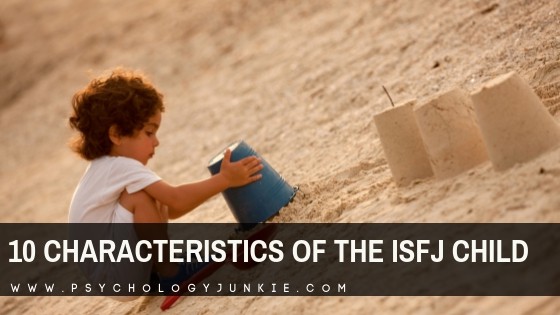ISFJs Are Protectors of the Traditions and Values That Preserve Communities
ISFJs are famous for their incredible compassion, unwavering dutifulness, and practical kindness. They masterfully handle the details, crafting a life that’s calm, tranquil, and rock-steady—all thanks to their down-to-earth and empathetic nature. They thrive when helping their loved ones in practical ways and doing what they can to improve their communities. Calm and soft-spoken, they avoid being showy or attention-seeking, instead preferring to do their kind deeds in the background without a lot of fanfare.
What Does ISFJ Stand For?
I = Introversion. ISFJs focus on the inner world before responding to the outside world. They gain energy from alone time when they can reflect on their own thoughts.
S = Sensation. ISFJs prefer taking in information that is tangible, realistic, and concrete. They would usually rather focus on what exists than hypothesize about abstract possibilities.
F = Feeling. ISFJs apply personal values and empathize in order to make a decision. They want what is best for the group or humanity as a whole.
J = Judgment. ISFJs like to settle things, make decisions, and maintain a sense of control or structure in their life.They are typically work-before-play people.


Famous ISFJs:
- Jimmy Carter
- George H.W. Bush
- Rosa Parks
- Mother Teresa
- James Comey
- Anthony Hopkins
- Naomi Watts
- Halle Berry
- Kendrick Lamar
- Dr. Dre
- Gwyneth Paltrow
- Selena Gomez
- Katie Holmes

ISFJ Motivations and Weaknesses:
- Driving Force. To live a life of stability, wellness, and comfort. Understanding what you can trust, what is true, and what satisfies your inner need for health and safety.
- Backup Strength: Unique understanding of people and their needs and preferences. Strong awareness of social expectations and human dynamics.
- Weaknesses: Can become “stuck in a rut” and overly-cautious about trying new things. May fail to entertain new ideas because they conflict with “tried-and-true” methods. At times they may ignore logic in favor of preserving people’s feelings.
- Stressors: Not getting alone time, facing unpredictable situations, dealing with inconsistent people, multi-tasking, encountering conflict, and handling unrealistic or impractical individuals.
ISFJ Personality Traits:
Everyone has one-of-a-kind qualities as well as influences from their background that shape their personality. But most average to healthy ISFJs have the following characteristics:
- They easily sense what other people are feeling
- Empathy and sympathy come easily to them
- They crave predictability and a sense of routine
- They are highly detail-oriented
- They are usually tactful and considerate
- They crave a tranquil, calm life
- They are gifted at reading people’s body language
- They easily compare and contrast past to present
- They enjoy post-processing experiences and reflecting on them to make them last.
- They are usually down-to-earth and grounded
Things ISFJs Look for in a Friend
Reliability
Someone who will show up and be there through good times and bad (preferably on time).
Empathy
Someone who will try to get in their shoes and understand their perspective with patience and insight.
Humor
Someone who enjoys laughing at the absurdities and quirks of life.
ISFJ Careers:
ISFJs want a career path that allows them to help people in practical ways and gives them a sense of security and routine. Detail-oriented and meticulous, they thrive in careers where they have their own private space to focus intently on their work. A lot of noise and commotion will make them stressed and exhausted at the end of the day. That said, working one-on-one with people can be really satisfying to them, especially if they’re able to help others improve their lives. They may enjoy coaching students who have special needs or they might get a thrill from the quiet, homey nature of a library. Whatever their career, they appreciate having clear objectives and expectations and regular feedback so that they know they’re on the right track.
Career Suggestions:
- Family physician
- Teacher
- Optician
- Human Resources
- Social Worker
- Veterinarian
- Librarian
- Genealogist
- Religious educator
- Writer
- Organic farmer
- Floral designer
- Artist
- Interior decorator
- Photographer.
ISFJ Strengths: What Makes Them Awesome
- Supportive to the Core: ISFJs are the friends who actually show up. They’re there with a listening ear, a helping hand, and probably a hot cup of tea—whatever you need. When they care about you, they’re all in, and they’ll remember the small things that make a big difference.
- Masters of Practical Magic: Need someone to organize the chaos? ISFJs thrive on turning overwhelming messes into manageable plans. They have this almost magical way of making the practical stuff feel like a gift—they’ll remember your favorite snack, book you an appointment, or find the perfect gift, all without missing a beat.
- Loyal (Seriously, Loyal): You want someone in your corner, for real? Call an ISFJ. They’re the ultimate “I’ve got your back” types, and they don’t take that role lightly. Once they’re committed to you, they’re there through thick and thin, rain or shine.
- Empathy in Action: ISFJs don’t just understand feelings—they do something about them. If they know you’re struggling, they’ll go out of their way to make life a little easier, checking in on you and finding thoughtful ways to lift your spirits.
- Detail Detectives: ISFJs have a knack for noticing the little things that others miss. Whether it’s a subtle shift in your mood or a detail you mentioned in passing three months ago, they catch it and remember. It’s their way of showing they care and that they’re truly present.
- Calm in the Storm: When things get rough, ISFJs are the steady, reassuring presence you need. They may not be the loudest in the room, but they’re definitely the most grounded. They bring calm and order to whatever chaos life throws your way.
ISFJ Cognitive Functions

Dominant Function: Introverted Sensing (Si)
ISFJs value learning from past experience and naturally tend to compare and contrast the present with what came before. They focus on details and cherish traditions, routines, and memories that provide stability and meaning. ISFJs thrive when given time to adapt to new situations and perform best with clear expectations and time to process change. With adequate preparation, they adapt remarkably well; however, rushing them into drastic change causes unnecessary stress.
Introverted Sensing also shows up in the communication style of the ISFJ. This type likes realistic, tangible information and tends to speak in a sequential, detailed way about experiences that are real rather than hypothetical. When speaking to an ISFJ it’s important to explain yourself in a linear, sequential way. They hate being rushed when giving details in a story.
Auxiliary Function: Extraverted Feeling (Fe)
ISFJs attune themselves to other people’s emotions and strive to maintain harmony in their outer worlds. They are usually tactful and considerate, and will go out of their way to be supportive and get peoples’ needs met.
The Feeling side of the ISFJ also shows up in communication. ISFJs enjoy talking about relationships and emotions and they enjoy encouraging or consoling when relationship changes arise. When people bring them a problem their first response will usually be to encourage, validate, or affirm the other person’s feelings. Because ISFJs are naturally interested in relationships they tend to pick up on interpersonal dynamics quickly and easily.
Tertiary Function: Introverted Thinking (Ti)
ISFJs use this function to analyze situations logically and methodically. Although it isn’t their main decision-making function, it still is a huge part of their lives. When alone, ISFJs enjoy analyzing information, learning how things work, or categorizing and sorting data. When ISFJs are with other people, they may dismiss this function in favor of getting people’s emotional needs met.
Inferior Function: Extraverted Intuition (Ne)
ISFJs use this function to open themselves up to new possibilities, brainstorm ideas, and make connections between abstract concepts. It may be a bit more challenging for them since it is one of their least-preferred cognitive functions. However, they can still tap into its creative potential at times, especially if it isn’t demanded of them on-the-spot.
When it comes to relationships, ISFJs bring their A-game. These are the people who will defend you, support you, and remember your favorite sandwich order from five years ago. Their hearts are about as generous as it gets—they take “it’s better to give than receive” to a whole new level. And if you’re dating an ISFJ, lucky you. This is someone who’s genuinely invested in your happiness and well-being, always thinking of little ways to make you feel valued and special.
ISFJs love deeply, and they take relationships seriously. They’re not here for flings or casual dates; they’re here to find true love. They’re naturally traditional and often feel out of place in today’s casual dating culture. ISFJ women might show up for dates with flowers in hand or chocolates tucked away, and ISFJ men often act like classic gentlemen, holding doors and walking their dates to the door after an evening out. They’re all about thoughtfulness and courtesy—it’s just who they are.
One of the things ISFJs want most is mutual commitment. They don’t just want to give and give while their partner sits back; they need to know their partner is as invested as they are. But here’s the catch—they have a hard time asking for what they need. They’re often so focused on others that their own desires get buried under the surface. They’re hoping to find someone who will gently draw them out and give them space to relax and just be cared for.
ISFJs with SJ Personality Types
If you’re an ISFJ with an SJ partner (another Guardian type), you’re likely to find a lot in common. Both of you are serious about responsibility, loyalty, and family values. It’s like “two peas in a pod” with you two! I’ve seen ISFJ/ESTJ or ISFJ/ISTJ couples who are perfect for each other… except when those STJs get a little too blunt with their words. ISFJs hate conflict and need harmony, so dealing with someone who’s a bit “cold” in their communication can be tough.
ISFJs with SP Personality Types
Next, ISFJs and SPs (Artisan types) often have that magical spark of chemistry. The free-spirited SP can help ISFJs loosen up, relax, and live in the moment. The ISFJ brings a grounding influence to the SP’s whirlwind, and the SP brings fun and excitement to the ISFJ’s world. However, SPs are often commitment-shy, so if you’re an ISFJ in this pairing, make sure both of you are clear on what you want. I’ve had ISFJ clients tell me that dating an SP feels like “adventure and stability all at once” but can sometimes feel like a balancing act between fun and the need for reassurance.
ISFJs with NF Personality Types
Being in a relationship with an NF type can be incredibly rewarding, especially because both types are so invested in creating harmony and making a difference. However, the Idealist’s tendency to dream big and focus on the abstract over the real can sometimes worry the more grounded ISFJ. I once had an ISFJ client say, “My NF partner had all these wild ideas for changing the world, and meanwhile, I was just trying to keep our home in order.” That’s not a bad thing—it’s just different approaches.
ISFJs with NT Personality Types
And then we get to NT types (Rationals). ISFJs often find them fascinating—their drive, their ambition, their endless curiosity. NTs, in turn, admire the stability and warmth of ISFJs, appreciating how the ISFJ spots details and reminds them of time-tested wisdom. But this pairing can have some challenges too. NTs sometimes overlook the things ISFJs do to make life feel warm and comfortable, while ISFJs might feel “shut out” by the NT’s focus on logic and theories. Yet, when each partner takes the time to understand the other’s world, this pairing can thrive.
ISFJs in Relationships: The Essentials
- Natural Givers: They love taking care of their loved ones in both big and small ways, but they need a partner who doesn’t just take, take, take.
- True Commitment Seekers: They value loyalty and stability and aren’t interested in fleeting flings or casual connections.
- Conflict-Avoidant: ISFJs are all about harmony. Blunt words and harsh criticism? Not their thing.
- Traditional and Thoughtful: They often appreciate the “old-fashioned” tokens of romance—holding doors, flowers, meaningful gestures.
- Hard Workers for Their Partner: If you’re with an ISFJ, you’re with someone who takes “commitment” seriously. They’ll stick with you through thick and thin.
This combination of devotion, thoughtfulness, and old-school values makes ISFJs wonderful, steady partners for anyone who’s looking for the real deal in a relationship.












